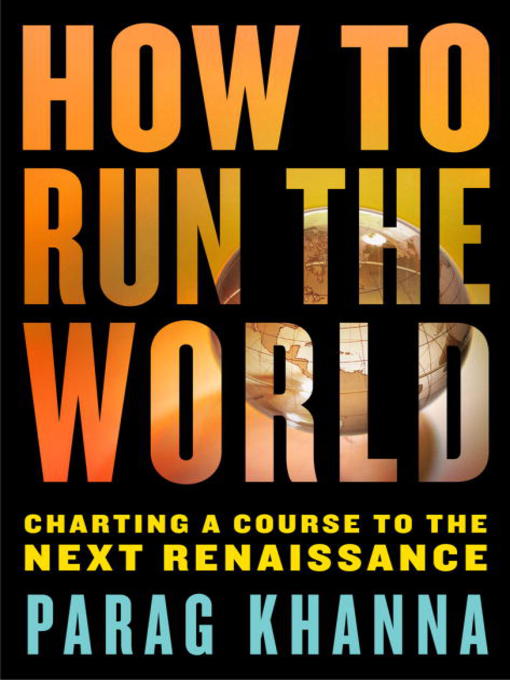With his trademark energy, intellect, and wit, Khanna reveals how a new “mega-diplomacy” consisting of coalitions among motivated technocrats, influential executives, super-philanthropists, cause-mopolitan activists, and everyday churchgoers can assemble the talent, pool the money, and deploy the resources to make the global economy fairer, rebuild failed states, combat terrorism, promote good governance, deliver food, water, health care, and education to those in need, and prevent environmental collapse. With examples taken from the smartest capital cities, most progressive boardrooms, and frontline NGOs, Khanna shows how mega-diplomacy is more than an ad hoc approach to running a world where no one is in charge—it is the playbook for creating a stable and self-correcting world for future generations.
How to Run the World is the cutting-edge manifesto for diplomacy in a borderless world.
-
Creators
-
Publisher
-
Release date
January 11, 2011 -
Formats
-
Kindle Book
-
OverDrive Read
- ISBN: 9780679604280
-
EPUB ebook
- ISBN: 9780679604280
- File size: 2183 KB
-
-
Languages
- English
-
Reviews
-
Publisher's Weekly
September 13, 2010
The "American Century" is over. According to Khanna (The Second World), "we are in for a fractured, fragmented, multi-polar" world, a new Middle Ages of decentralized power where "corporations, powerful families, humanitarians, religious radicals, universities, and mercenaries are all part of the diplomatic landscape." In a world of "mega-diplomacy," efficient remedies to global poverty, environmental crisis, and genocidal threats will require fresh combinations of governments, NGOs, and corporations that can marshal "global resources to solve local problems." His book is an excellent introduction to worthy organizations tackling social and political problems, but in going for a panoramic sweep and trying to cover so many topics, the analysis deals with none in depth. Case studies rarely pass the two-page mark, and Khanna drowns the reader in data stripped of context and resonance. His vaunting of celebrity activists feels callow, and his championing of online petition sites is premature—the real efficacy of such methods is still in question. Khanna writes clearly, with conviction and charm, and his neomedieval metaphor is so intriguing that readers will regret Khanna's decision to stay in the shallows. -
Kirkus
October 15, 2010
New America Foundation senior research fellow Khanna (The Second World: Empires and Influence in the New Global Order, 2008) calls for a new "mega-diplomacy" to solve problems in a period of global uncertainty.
Diplomats have long negotiated how to run the world, writes the author. In ancient Sumerian city-states, they channeled the messages of deities among kings. In modern times, they have divvied up the globe after major wars. With no single power in control, today's "fractured, fragmented, ungovernable" post–Cold War world demands a new kind of diplomacy based on coalitions of governments, corporations and civic actors. Empowered by the information revolution, writes Khanna, public and private partners can collaborate efficiently across national borders to meet such 21st-century challenges as terrorism, the AIDS epidemic and climate change. Key practitioners of this new diplomacy include the entrepreneurs, academics, activists, celebrities and others who have worked in unusual and collaborative ways to achieve such goals as a landmine ban, debt relief and the International Criminal Court. They range from Bill and Melinda Gates to luminaries like Bono and Angelina Jolie—all individuals with resources and influence—and include NGOs like the Open Society Institute, which shapes important global questions; the World Economic Forum, "archetype of the new diplomacy," which brings diverse players together on equal footing at annual summits; and the Clinton Global Initiative, which fosters cross-sector partnerships among leaders in politics, business and civil society. Khanna suggests ways in which the new diplomacy can help spur fresh approaches in problem areas—encouraging greater intelligence cooperation on terrorism among countries, giving Somali fishermen incentives to not engage in piracy (such as new boats to boost their catch) and convincing regimes in Iran and North Korea that they don't need nuclear programs. In the environmental arena, meaningful public-private initiatives spurred by the new diplomacy can have far more impact than international agreements, he writes. For a model of mega-diplomacy, the author points to Europe, where members of the borderless European Union are experimenting and cooperating to meet shared challenges.
A valuable contribution to the global-governance debate.
(COPYRIGHT (2010) KIRKUS REVIEWS/NIELSEN BUSINESS MEDIA, INC. ALL RIGHTS RESERVED.)
-
Loading
Why is availability limited?
×Availability can change throughout the month based on the library's budget. You can still place a hold on the title, and your hold will be automatically filled as soon as the title is available again.
The Kindle Book format for this title is not supported on:
×Read-along ebook
×The OverDrive Read format of this ebook has professional narration that plays while you read in your browser. Learn more here.


